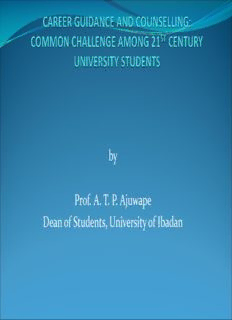
CAREER GUIDANCE AND COUNSELLING PDF
Preview CAREER GUIDANCE AND COUNSELLING
by Prof. A. T. P. Ajuwape Dean of Students, University of Ibadan INTRODUCTION We live in a knowledge society, and in an era in which time is fluid nothing lasts, everything changes and is unstable. The Federal Government of Nigeria, in a commendable step, introduced Career guidance and counseling services in Nigerian Universities. The programme has helped to solve some of the challenges (academic/ antisocial behaviours among the students) being faced by the 21st century students. The challenges among students that often come under career guidance and counseling are multifarious Some of them are discussed as follows: 1. Falsification of documents Many students have been found either falsifying their age, their source of origin, local government or even state of origin, possibly to gain an undue advantage or monetary benefits. . 2 Lying Several students tell lies to cover up their disadvantage complex. Some lie that they are orphans whereas their parents are still living. . 3 Poor academic performance Many students perform poorly in their academics and are frustrated. Some complain about difficult courses, inconsiderate and difficult lecturers, inaccessible lecturers, unfriendly level coordinators etc. 4. Academic-success barriers include the following: I Truancy behaviour, ii Poor study habit iii; Career crisis; iv Examination malpractices; v Drug abuse vi Cultism behaviour vii Conduct disorder viii Indecent dressing ix Sexual promiscuity x Pornographic behaviour xi Violent behaviour xii Negative Peer influence xiii Negative self component (Poor self concept, Low self esteem, Low self efficacy) xiv Poor Time Management. Each of these is briefly discussed below: Truancy: A student who fails to attend classes regularly has missed the first stage of learning which is acquisition stage; definitely, he has little or nothing to retain at the retention stage; and may not function properly at the recall stage (Animasahun, 2005, 2008). Some reasons for truancy include: non-challant attitude, poor self organization, poor time management, laziness, distraction, poor priority, peer group influence Poor Study habit: If a teacher teaches, and a farmer farms, the major duty of a student is to study. A student who fails to study properly may not achieve academic success. (Bakare, 1977, 1994; Cook, 1999). Many students complain that they read but never assimilate or read but do not understand, while examination anxiety is the problem of others. All these problems have been traced to poor study habit. Career Crisis: When parents choose or for force their children to choose certain courses; or possibly students who could not secure admission into the courses of their choice but given other courses, other faculties and other departments to execute their studies. Inability to be focused as a result of career indecision may cause emotional problems for the student, and possibly because he has no interest, ability or personality endowment suitable for the chosen line, may be a pointer to lack of seriousness or dedication and consequent failure (Bakare, 1977; 1994). Examination Malpractices: A student who anticipates cheating in examinations or believes that he would receive certain assistance may not prepare adequately for examinations. When disappointment suddenly strikes, he is disorganized and may fail to achieve academic-success (Kasen, Cohen and Brook, 1998). When caught, such Students are made to face disciplinary actions. However, remediative, reformatory and rehabilitation procedures are put in place to restore them to normalcy. Severe penalty is given to Postgraduate student(s). . Drug Abuse: Drug use, misuse or abuse intoxicates the brain, and may prevent the brain from assimilating very well. This would eventually pave way for academic-failure (Kasen, et. al., 1998; Haliffors et.al., 2002), Schulenberg et al., 1994) . Many misbehaved students have been found to be involved in drug use, misuse and abuse. Substances youths now take
Description: